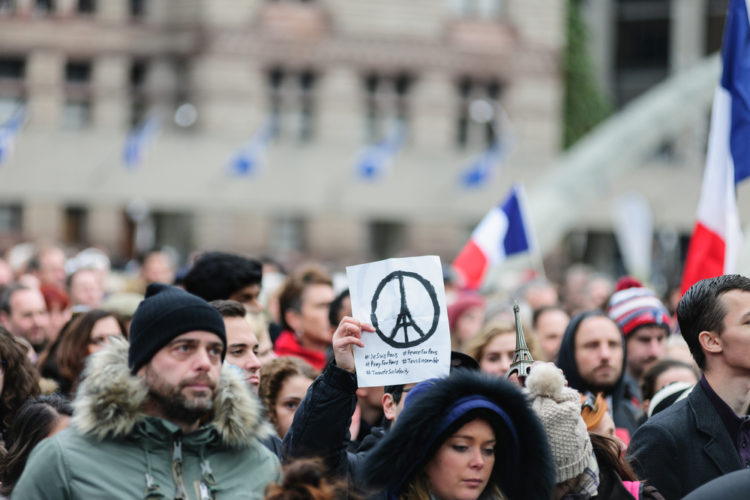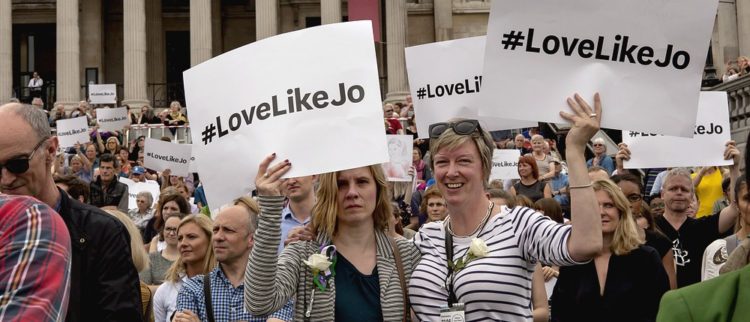What Attachment Theory Teaches Us About Responding To Brexit
I think that, over the last week, I have read just about every Brexit opinion piece published anywhere. What is there to be said that hasn’t been said? What words are left that could be of use?
How about these three words? “Rupture and repair.”
The concept of ‘rupture and repair’ lies at the heart of contemporary attachment theory. That cycle is regarded as the key to understanding what makes relationships emotionally healthy. Ripples, storms, even tsunamis are a part of any long-term relationship. Modern day attachment research shows that it isn’t the ruptures that matter most to relationship sustainability. Instead, it is the repairing of ruptures.

That is what we face now in the UK. Brexit has created a terrible rip in the fabric of our society. Remain Voters feel betrayed by Leave Voters. Leave Voters feel irritated with the continuing ‘whinging’ of Remain Voters. Voters everywhere feel unsettled by the resignations of so many politicians, supplemented by fury at the lies the campaign was based on. Racist acts have increased five-fold. Friendships and families have been injured, split over the anger and dismay that has erupted within them.
A nation ruptured indeed. John Litchfield did not exaggerate when he described Britain as being “on the verge of a nervous breakdown”.
Over the past two weeks, Brexit has been analysed from any number of angles. Tim Lott guessed that social inequality lies at its heart. Matthew Goodwin recounted the sense of alienation felt by Leave Voters. Ollie McAninch explored the deliberate use of misdirection to support a fear-based agenda. So much of what has been written have been attempts to understand what has happened.
The piece that has stayed with me the most, though, is the one written by Henry Kissinger. He looked in the opposite direction — toward the future. He asked what we should be striving for now (whether or not or whenever Article 50 is eventually implemented). His focus wasn’t trade agreements, free movement or immigration quotas. He wasn’t talking specifics.
Instead, he emphasised the spirit that needs to guide our next steps. Kissinger brings to his comments the experience he gained serving as Secretary of State for two US Presidents (Ford and Nixon). Whatever you may feel about his political decisions while in office, his comments here breathe the wisdom of a statesman. Kissinger’s piece urges us to keep our eyes on vision – on the purpose of the EU, rather than its structures.
Here is Kissinger’s core message:
“Britain will want to maintain extensive ties with Europe while easing the constraints of its many legislative and bureaucratic requirements. The EU leadership has almost the opposite incentive. It will not wish to reward Britian’s Leave majority by granting Britain better terms than it enjoyed as a full member. Hence a punitive element is likely to be inherent in the EU bargaining position….[But I] hope the EU will transcend itself, seeking its vocation not in penalising the recalcitrant but by negotiating in a manner that restores the prospects of unity. The EU should not treat Britain as an escaper from prison but as a potential compatriot.”
Kissinger is talking about repair.
Attachment research shows that in healthy, ‘good enough’ relationships, the ordinary cycle of attunement travels through three phases. Roughly one-third of time is spent in actual relating (attuned connection), one-third in rupture (mis-attuned connection) and one-third in repair (recovering attuned connection). Repair is the most important phase in the cycle. Repair not only rewires patterns of behaviour, it also establishes trust. You come to know that you can fall out with someone while still trusting that your connection with ‘the other’ does not risk being severed forever. Rupture does not have to equate to the terror of abandonment.
Allan Schore, one of the world’s leading attachment theorists, stresses that ruptures are an inevitable and natural element of relationships. We should not seek out relationships in which there is never any rupture (which in itself actually signifies dysfunction). It is learning how to engage in repair that creates healthy relationships. Although Schore, along with other leading theorists such as Dan Siegel and Ed Tronick, is best known for discussions of parent-child relationships, the explanation applies to all relationships, whatever the age of the human beings involved.
So what is needed to achieve repair? Here’s how one mother, Michele Deen, describes her own efforts to do that in her relationship with her daughter:
“First and foremost, repair involves parental insight and awareness that leads to a type of healing reconnection. For instance, for me it means noticing when I’m being emotionally reactive, stopping in my tracks and analyzing the situation. Next, I tune in to the experiences and feelings of my daughter. From here it’s essential to find a way to communicate with the child so that he/she feels understood and regarded by you, the parent. This allows an opening for the noxious effects of the incident—shame, humiliation and any number of seething emotions—to dissipate.”
Guess what? That’s what is not happening within Britain. We are nowhere near noticing when we are emotionally reactive or allowing noxious effects to dissipate. Instead, the Rupture is getting worse. Surprise after surprise, uncertainty after uncertainty, anger after recrimination, is unfolding. And our leading politicians, caught up in their own self-obsessed wrangles, are entirely incapable of reflecting enough to move us toward repair.

Pam Jarvis, leader of the Too Much Too Soon Campaign, made that same point even more sharply in her brilliant piece:
“The disaffected British population has in this sense behaved as the collective dysfunctional ‘offspring’ of a ‘parental’ ruling class whose lack of care most recently sunk to the depths of risking the nation’s future as collateral in a high-stakes game of personal one-upmanship that began in the classrooms and playing fields of Eton; 64 million pawns sacrificed to internal Westminster in-fighting in a high-stakes game without a contingency plan.”
So: if our neglectful parent-politicians can’t help, then we need to seek out opportunities for repair ourselves.
Like everyone else, I have no idea how long the anxious uncertainty will go on for. What I do know, based on attachment theory, is that the longer it takes, the more toxic this national rupture becomes, and the harder it will become to achieve repair. Great risks lie in the failure to achieve repair. As Kissinger warned, “Ignoring the concerns that Brexit manifests is a path to greater disillusionment.”
We have been reminded all too starkly this week of the terrible consequences that arise from failure to repair.
One reminder occurred on 1st July. That date marked the centenary of the beginning of the Battle of the Somme. On that single day during the First World War, nearly 20,000 young British men died. Over the next five months of the Somme campaign, over one million British, French and German men would be killed or wounded. Words that have been used to describe the madness of that day include ‘gory’, ‘bloody’, and ‘horrific’. Soberingly, this week Simon Tinsdall traced that “muddy, futile battlefield” to the tensions he sees as driving Brexit.
On the morning of Friday, 1st July 2016, UK citizens woke to a surprise public art event. In public spaces throughout the UK – train stations, bus stations, shopping malls, streets, steps of civic buildings – the public found themselves walking past young men dressed in WWI uniforms. If they stopped to speak to one of these volunteer actors, they were handed a small card containing the name, rank, battalion and regiment of a man who had died at the Somme. Entitled ‘we’re here because we’re here’, this living, largely silent memorial was the tribute created by prize-winning artist Jeremy Deller to mark the waste that occurred one hundred years ago this week.
Perhaps the tribute will have brought some healing to families such as the Guyons, who described in an interview the inter-generational consequences of their grandfather’s death at the Somme. “We have grown up with a father who was very seriously damaged by his mother’s grief at his father’s death. It totally blighted his life.” For the Guyon family, and countless others like them, the Somme left a “wound that hasn’t healed”, even one hundred years on.
So let’s put the sacrifice of those young men into a wider historic context. What happened after their deaths? – deaths which many have now argued were needless political folly? What happened was that a mere 21 years later, merely a single generation, another war descended. As any student of 20th century history will tell you, WWII was largely a result of politicians’ failure to focus on repair. The victors of WWI sought to punish the losers. That led to the economic depression, despair, nationalism and polarisation from which WWII was born. WWII took another 50 million lives, not forgetting the 6 million people who died as scapegoats in Nazi concentration camps. The European Union was founded to prevent such catastrophic division from ever occurring again within Europe. Simon Tinsdall observes, unnervingly, that that possibility seems “less unimaginable” than it did two weeks ago.
A second event that occurred this week, which also laments the failure to repair, was the publication of the Chilcot Report. The basis for the UK-US coalition invasion of Iraq in 2003, under the banner ‘Operation Freedom’, has been totally discredited. The degree to which lies (or ‘mistakes’, depending on your viewpoint) underpinned the arguments for action have been exposed, along with the lack of any follow-up plan. The thinking bears uncomfortable similarities to elements of Brexit.
Simultaneously, reports continue to pour in of the consequences of the Iraq War. This week, for example, one report highlighted the lack of a functioning health service. Most of Iraq’s 1700 healthcare centres have no running water or electricity. There is no system in place to train sufficient health professionals, and the equipment available in hospitals is appalling. The World Health Organisation has described the situation as “bad, really bad, and getting worse”. Yet in the 1980s, Iraq’s health care system was one of the most advanced in the Middle East. Trauma that the UK helped to cause, on the basis of ‘mistakes’, which the leaders involved have this week continued to defend, will rumble on for generations. We contributed to our own suffering in the West, which has come in the form of terrorism and mass refugee desperation.
I realise that it has taken 7 years to gain the perspective afforded by the Chilcot Report. I recognise it has taken 100 years to see the enduring devastation of WWI. And I accept it is too soon to begin recovering from the wounds caused 2 weeks ago by Brexit. For wounds they are. Brexit has turned out to be about much more than a democratic process. It has challenged more than our beliefs about economics, sovereignty and political leadership. Brexit has become, at its core, an assault on our sense of identity and belonging.

Identity and belonging are precisely what attachment is all about. That is why it is so deeply troubling for us all. Who are we now? To which ‘tribe’ do we belong? And which ‘tribes’ do we choose to see as the ‘them’ in contrast to the ‘us’?
Yet, difficult conversations are what repair is all about. Repair is often not easy. How do you listen to another person’s feelings when your own emotions feel intense, legitimate, overwhelming and simply RIGHT? How do you listen to the feelings of the person whom you feel has betrayed, ignored, humiliated, abandoned you? How do you resist blame and accusation? How do you do that when your leaders are incapable of seeing their own emotional reactivity or owning their responsibility?
These are the questions that organisations like the Centre for Nonviolent Communication and the Restorative Justice Council deal with all the time, in their search for ways of promoting connection, via compassion rather than polarisation. And that’s what Kissinger is trying to get us to think about. “The needed restoration of faith will not come about through recriminations.” It’s what Susie Orbach said this week too: “Agony can gain temporary relief through attack….but almost inevitably, whether in politics or personal life, attack compounds things. Our eyes are drawn to the wrong target.”
If we cannot find our way back to (enough) unity, then we risk rupture taking on a more lethal form. We risk future families, like the Guyons, bearing wounds that travel down the generations.
So what do we do if repair simply feels too soon, too raw, just now? My answer is this: what if we just try to keep the rupture from becoming worse? Here is one tiny thing I did this week: I refrained from tweeting everything I felt. I kept myself from expressing every negative emotion and thought that went through my head. My goal was not to feed the negativity and fear felt by others around me in my social media circle. It wasn’t easy. Sometimes it meant I had to kick the table instead. But I figured that my hurt toe carried less chance of unintended consequences than would my angry, accusatory words. I tried to do what our politicians and much of the media have been unable to do: I tried to take responsibility for my actions.
I choose to have faith that my acts matter. Even the small ones. Because one day we will reach repair. We will have to renew our ties to one another. The fewer ties that have been broken, strained, bruised and cut, the easier the process of repair will be.
Don’t take my words for it. There are better words than mine available.

There are the words of esteemed MP Jo Cox. She said: “We are far more united and have far more in common with each other than things that divide us.”
There are the words of the Nobel Peace Prize winner, Elie Wiesel, who survived Nazi concentration camps and who died this week: “When human lives are endangered, when human dignity is in jeopardy, national borders and sensitivities become irrelevant.”
And there are the words of the woman who sent me this Facebook message last week: “A few months ago I attended an attachment training event you gave on ‘challenging behavior as distressed feelings’. That day inspired me in my care of the kids I work with. I think a lot of hearts were touched that day. Months later, I can see the benefits of a gentle approach…. A compassionate supportive approach is unbelievably more helpful than is calling on selfish blame.”
Maybe it really is enough, for right now, if all I can think to do – all each of us can do — is try to avoid making the rupture any worse. We can fight fear, rather than each other.
Featured photo Shutterstock/aldorado

